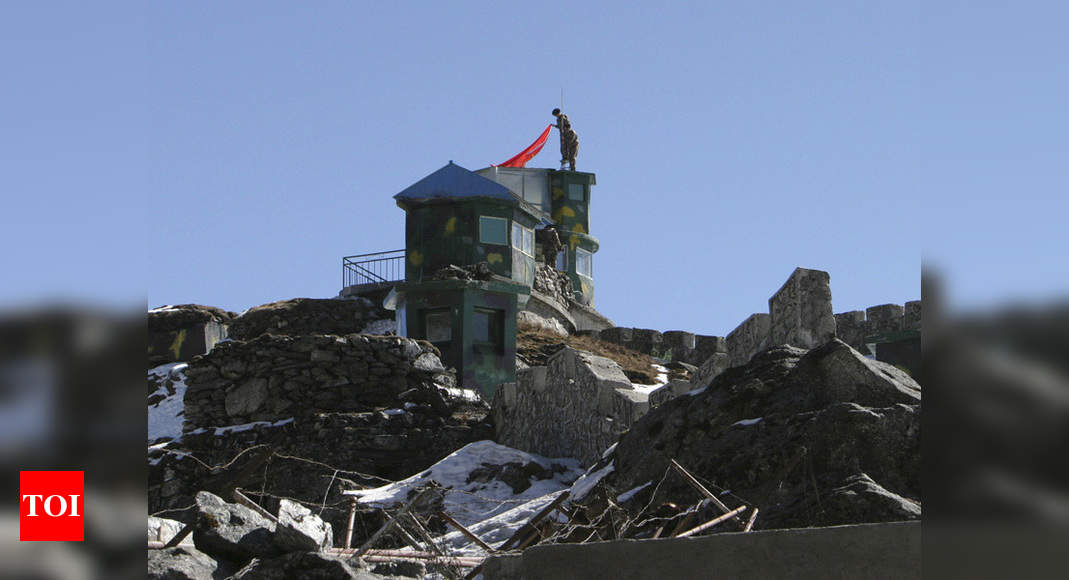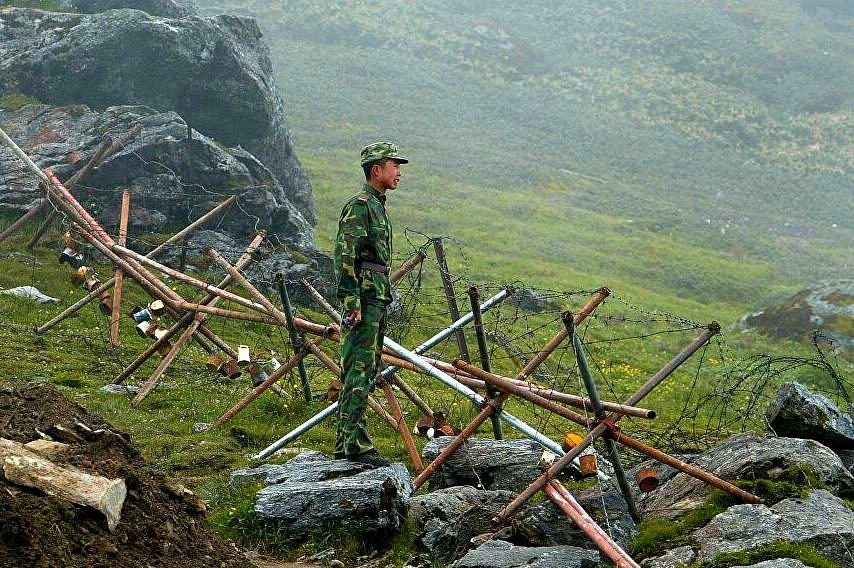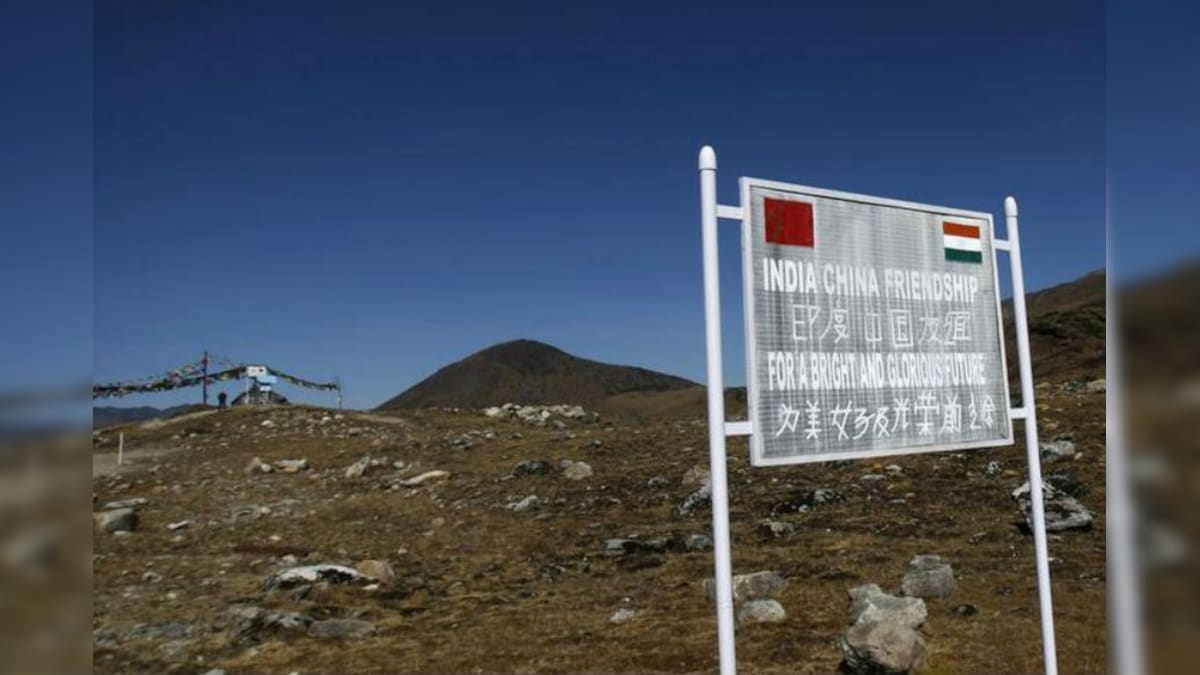Before throwing weight behind Taiwan, we should ask them whether they consider Arunachal Pradesh their own territory or not.
Ahh, yes another Doklam crisis. Only this time Global Times is taking the lead in fooling the world and their own pig-sty citizens to cover up it's party's loss of image. Just the text reveals their intent, as clear and flawless as a diamond.......
India China LAC & International Border Discussions
- Thread starter tsunami
- Start date
- Status
- Not open for further replies.
More options
Who Replied?Craigs
New Member
- Joined
- Sep 22, 2016
- Messages
- 1,405
- Likes
- 3,387
Have you read the panchtantra? If Taiwan wants to fight China we should encourage it.Before throwing weight behind Taiwan, we should ask them whether they consider Arunachal Pradesh their own territory or not.
Gautam Sarkar
New Member
- Joined
- Apr 24, 2019
- Messages
- 471
- Likes
- 2,346
A day after it emerged that a serious build-up underway in Galwan, in Chinese occupied Ladakh, Chinese envoy in Delhi shares a happy video of Jackie Chan asking India to stay strong amid #COVID crisis.
A good thread about border infrastructure :
Since DBO/Galwan/Depsang areasre in the news, it is important to put the area in context. (see map) Darbuk-Shyok-Daulat Beg Oldi (DBO) Road in Ladakh which provides access to Depsang plain and Galwan Valley was completed by the Border Roads Organisation (BRO) exactly a year ago.
A good thread about border infrastructure :
Since DBO/Galwan/Depsang areasre in the news, it is important to put the area in context. (see map) Darbuk-Shyok-Daulat Beg Oldi (DBO) Road in Ladakh which provides access to Depsang plain and Galwan Valley was completed by the Border Roads Organisation (BRO) exactly a year ago.
Gandaberunda
New Member
- Joined
- Apr 6, 2019
- Messages
- 1,813
- Likes
- 8,576
Interesting Investigation of the recent #IndoSino tensions in the #Galwan area via geospatial data helps identify ongoing earthwork developments & accelerated strategic changes at both ends by #India - #China #IMINT
Bhadra
New Member
- Joined
- Jul 11, 2011
- Messages
- 11,991
- Likes
- 23,756
Oh Nitin Gokhale Ji , What the hell man? Using Claud Apri Map of 1962 aggression without any annotation and marked road ??A day after it emerged that a serious build-up underway in Galwan, in Chinese occupied Ladakh, Chinese envoy in Delhi shares a happy video of Jackie Chan asking India to stay strong amid #COVID crisis.
A good thread about border infrastructure :
Since DBO/Galwan/Depsang areasre in the news, it is important to put the area in context. (see map) Darbuk-Shyok-Daulat Beg Oldi (DBO) Road in Ladakh which provides access to Depsang plain and Galwan Valley was completed by the Border Roads Organisation (BRO) exactly a year ago.
Road to mark kar data bhai.....
Bhadra
New Member
- Joined
- Jul 11, 2011
- Messages
- 11,991
- Likes
- 23,756
Sorry Sir, I do not know anything about all those things..... those are quite high up and I have no access to anything military..

I only know that no road can be made near the LC so near as 50 meters because of ground configuration... However all battalions will be connected by road as per standard policy of IA. Only some roads reach up to LAC where there is border trade or where border personal meetings take place or where there are hotline alignments.. Such as Bumla... Nathu La, Shipkila...
I do not know anything about Central Command if it has any troops...??
Deception by creating HQ 17 Corps at Panagarh is possible but then why have 17 Corps resources in the East ??? Chinese LAC require high altitude acclemetised troops. That is bloody no deception.... Corps HQ can move anywhere... Even 2 Corps HQ can launch that operation -- what the hell..
I really do not know why is he suggesting HP unless he likes fine grass of Kullu Manali..... better weeds are available in interiors of Uttarkhand... Only Israelis do not know about it or not allowed there....



It is going to be about the one-year operation... suppose Indian troops go inside from Yatoong and return back from Demchok.... Skelton of Zorawar's great Dogra soldiers who went towards Rudok can still be found in Roopatal in Uttarakhand...
LETHALFORCE
New Member
- Joined
- Feb 16, 2009
- Messages
- 29,968
- Likes
- 48,929

Chinese troops resort to aggressive posturing in Ladakh, North Sikkim: Sources | India News - Times of India
India News: Tension is gradually building up between Indian & Chinese armies in several areas in Ladakh and northern Sikkim along the un-demarcated Sino-India bor
Chinese troops resort to aggressive posturing in Ladakh, North sikkim
LETHALFORCE
New Member
- Joined
- Feb 16, 2009
- Messages
- 29,968
- Likes
- 48,929

India-China Stand-Off In Ladakh: Here’s Everything We Know So Far About The Face-Off In The Galwan Valley
Although the government and the Army have not spoken out on the new flashpoint, the stand-off is believed to have started on 5 May.
swarajyamag.com
India-China Stand-Off In Ladakh: Here’s Everything We Know So Far About The Face-Off In The Galwan Valley
LETHALFORCE
New Member
- Joined
- Feb 16, 2009
- Messages
- 29,968
- Likes
- 48,929

Ladakh Standoff Biggest Escalation Since Doklam, Says Chinese Media; Indian Army Refuses to Comment - News18
The state-run Global Times said the PLA has "bolstered border control measures in response to India building defence facilities in Chinese territory".
Ladakh Standoff Biggest Escalation Since Doklam, Says Chinese Media; Indian Army Refuses to Comment
Gautam Sarkar
New Member
- Joined
- Apr 24, 2019
- Messages
- 471
- Likes
- 2,346
Thread :
Breaking news: While tension between Indian and PLA troops at Galwan continues to remain high, in what could be construed as the first signs of a thaw, brigade commanders from either side met at the Finger 4 area near Pangong Tso (lake) this morning, according to informed sources
Citing sources, @nitingokhale writes the trigger for the China-India standoffs this month was likely "India's decision to build a short but strategically important road in the Galwan valley."
India's been trying to narrow the infrastructure gap at the LAChttps://
 delhidefencereview.com
delhidefencereview.com
Breaking news: While tension between Indian and PLA troops at Galwan continues to remain high, in what could be construed as the first signs of a thaw, brigade commanders from either side met at the Finger 4 area near Pangong Tso (lake) this morning, according to informed sources
Citing sources, @nitingokhale writes the trigger for the China-India standoffs this month was likely "India's decision to build a short but strategically important road in the Galwan valley."
India's been trying to narrow the infrastructure gap at the LAChttps://
A Note On Chinese Provocations in Ladakh & The Indian Response | Delhi Defence Review
 delhidefencereview.com
delhidefencereview.com
Gautam Sarkar
New Member
- Joined
- Apr 24, 2019
- Messages
- 471
- Likes
- 2,346
Better Indian sinews cause Sino-Indian fisticuffs
Seriously though, India has an overwhelming superiority of numbers on LAC (fact tht no1 mentions) - we r 8:1 on fwd-deployed troops. We also have better/more widespread battlefield experience in hi-alt warfare. Chinese advtg is in terrain + infrastructure.
India's former foreign secretary and ambassador to China, Vijay Gokhale (@VGokhale59) on Chinese diplomacy then and now:
“India has been upgrading its infrastructure along the border, thereby allowing troops to patrol with greater depth and frequency into areas where the Chinese had ... established a more frequent presence. That is now being challenged.”
“By December 2022, all 61 strategic roads along the border, spread across Arunachal Pradesh, Jammu and Kashmir, Sikkim, Uttarakhand and Himachal Pradesh, will be completed, adding up to 3,417 km in length.”
Seriously though, India has an overwhelming superiority of numbers on LAC (fact tht no1 mentions) - we r 8:1 on fwd-deployed troops. We also have better/more widespread battlefield experience in hi-alt warfare. Chinese advtg is in terrain + infrastructure.
India's former foreign secretary and ambassador to China, Vijay Gokhale (@VGokhale59) on Chinese diplomacy then and now:
“India has been upgrading its infrastructure along the border, thereby allowing troops to patrol with greater depth and frequency into areas where the Chinese had ... established a more frequent presence. That is now being challenged.”
“By December 2022, all 61 strategic roads along the border, spread across Arunachal Pradesh, Jammu and Kashmir, Sikkim, Uttarakhand and Himachal Pradesh, will be completed, adding up to 3,417 km in length.”
Gautam Sarkar
New Member
- Joined
- Apr 24, 2019
- Messages
- 471
- Likes
- 2,346
A bit OT but SCS related :
Wow, they've done it! Philippines upgrades its base on Thithu in the Spratlys despite months of blockade by Chinese maritime militia.
The #Philippines thumbs it's nose at #Beijing & secures it's base on Thithu in the Spratlys . Looks like @RRD__Davao may have been awaiting an opportune time to land this punch.
Should be one of the first places the @hukbongkatihan deploys a #Brahmos battery
Wow, they've done it! Philippines upgrades its base on Thithu in the Spratlys despite months of blockade by Chinese maritime militia.
The #Philippines thumbs it's nose at #Beijing & secures it's base on Thithu in the Spratlys . Looks like @RRD__Davao may have been awaiting an opportune time to land this punch.
Should be one of the first places the @hukbongkatihan deploys a #Brahmos battery
captscooby81
New Member
- Joined
- Dec 25, 2016
- Messages
- 7,371
- Likes
- 27,670
This doesn't look at all good 76 soldiers injured including a senior officer Brigadier ?  I think more than giving guns to Jawans , we need to quickly provide them riot gear so that they can save themselves from stone pelting , Baton studded with nails and all type of trashing . We won't fire a damn bullet for sure even if soldier gets killed by stone pelting
I think more than giving guns to Jawans , we need to quickly provide them riot gear so that they can save themselves from stone pelting , Baton studded with nails and all type of trashing . We won't fire a damn bullet for sure even if soldier gets killed by stone pelting

 I think more than giving guns to Jawans , we need to quickly provide them riot gear so that they can save themselves from stone pelting , Baton studded with nails and all type of trashing . We won't fire a damn bullet for sure even if soldier gets killed by stone pelting
I think more than giving guns to Jawans , we need to quickly provide them riot gear so that they can save themselves from stone pelting , Baton studded with nails and all type of trashing . We won't fire a damn bullet for sure even if soldier gets killed by stone peltingcaptscooby81
New Member
- Joined
- Dec 25, 2016
- Messages
- 7,371
- Likes
- 27,670
Now MEA issues statement Peace Peace Peace Peace . We can't take these PLA thugs head on right now also . peking premi in delhi keep issuing these peace statements . Xi gives a fuck about Chennai summit


Bhadra
New Member
- Joined
- Jul 11, 2011
- Messages
- 11,991
- Likes
- 23,756
Bhadra
New Member
- Joined
- Jul 11, 2011
- Messages
- 11,991
- Likes
- 23,756
As soon as China recovered from the dreaded Covid19, it started a new battle, an Information Warfare (IW) to change the way the world presently perceives the Middle Kingdom. In the process, Beijing found it sometimes necessary to show force, and the recent incident in Northern Sikkim and in Ladakh should be seen in this perspective.
Since the outbreak of the virus in December, the Communist regime discovered that it had not many friends on the planet. Even Vladimir Putin was targeted by Beijing asking the Russian authorities not to discriminate against Chinese citizens; reports had appeared of police raids in Moscow against people from China evading quarantine measures.
The IW counterattack
Soon Beijing decided to counterattack. Zhao Lijian, one of China’s sharp shooters and now a spokesperson of the Ministry of Foreign Affairs, alleged that the Americans were at the origin of the virus.
Another shot came from the Chinese Embassy in Australia who emailed local journalists, accusing them of “politicizing the coronavirus” by saying it originated in China “without any supporting facts.”
Financial Review journalist Michael Smith received an email from the Chinese embassy in Canberra, complaining that he had called the Covid-19, ‘China virus’. Smith asserted that Beijing “has pivoted its propaganda narrative, now insinuating that the virus originated in other countries.”
Later the Chinese ambassador in Australia threatened Canberra: “If you push for an inquiry into the Wuhan lab, we will stop buying your wine”.
The strong-arm technique is a bit gross, but it often works.
The symptoms of the Chinese aggressiveness were also seen on February 18 when Hou Yanqi the Chinese ambassador to Nepal, issued a statement criticizing an article published in the Nepali press: “The Kathmandu Post published an article which, with a picture of malicious intention, deliberately smeared the efforts of the Chinese government and people fighting against the new coronavirus pneumonia and even viciously attacked the political system of China.” The lady ambassador went a step further; she accused by name the chief editor of The Kathmandu Post, Anup Kaphle of being biased.
Examples could be multiplied.
Since the outbreak of the virus in December, the Communist regime discovered that it had not many friends on the planet. Even Vladimir Putin was targeted by Beijing asking the Russian authorities not to discriminate against Chinese citizens; reports had appeared of police raids in Moscow against people from China evading quarantine measures.
The IW counterattack
Soon Beijing decided to counterattack. Zhao Lijian, one of China’s sharp shooters and now a spokesperson of the Ministry of Foreign Affairs, alleged that the Americans were at the origin of the virus.
Another shot came from the Chinese Embassy in Australia who emailed local journalists, accusing them of “politicizing the coronavirus” by saying it originated in China “without any supporting facts.”
Financial Review journalist Michael Smith received an email from the Chinese embassy in Canberra, complaining that he had called the Covid-19, ‘China virus’. Smith asserted that Beijing “has pivoted its propaganda narrative, now insinuating that the virus originated in other countries.”
Later the Chinese ambassador in Australia threatened Canberra: “If you push for an inquiry into the Wuhan lab, we will stop buying your wine”.
The strong-arm technique is a bit gross, but it often works.
The symptoms of the Chinese aggressiveness were also seen on February 18 when Hou Yanqi the Chinese ambassador to Nepal, issued a statement criticizing an article published in the Nepali press: “The Kathmandu Post published an article which, with a picture of malicious intention, deliberately smeared the efforts of the Chinese government and people fighting against the new coronavirus pneumonia and even viciously attacked the political system of China.” The lady ambassador went a step further; she accused by name the chief editor of The Kathmandu Post, Anup Kaphle of being biased.
Examples could be multiplied.
Bhadra
New Member
- Joined
- Jul 11, 2011
- Messages
- 11,991
- Likes
- 23,756
Aggressiveness everywhere
China has not limited the ‘battle’ to the diplomatic field alone; the People’s Liberation Army (PLA) has become aggressive on the ground too.
The recent ‘fights’ in Northern Sikkim and Ladakh are part of the same pattern.
It is a fact that in 2017, despite the conflict at the trijunction between India, Bhutan and China, the Northern Sikkim border was ‘settled’.
In these circumstances, it was rather surprising that Indian and Chinese soldiers recently exchanged blows south of Naku La (pass).
Quoting two senior officials on the condition of anonymity, The Hindustan Times explained: “Scores of Indian and Chinese soldiers were involved in a tense face-off along the India-China boundary in north Sikkim.” In the scuffle several jawans were injured: “Four Indian soldiers and seven Chinese troops suffered injuries during the confrontation that involved around 150 soldiers.”
The confrontation took place south of Naku La, the border pass in the sector and north of Muguthang, a place that China has tried to capture since some time (where incidentally a helicopter of the Indian Air Force had crashed at Dolma Samba), not far away in the same sector, two days before the ‘fight’).
Around the same time, worrying developments were reported from the Northern Ladakh.
The Northern Boundary of Sikkim
The boundary with Tibet (now China) in northern Sikkim can be roughly divided in two parts; the eastern part is delineated by 23 cairns which were erected by Claude White, the British Political Officer (PO) in Sikkim in 1905. Apart from one cairn, known as the ‘Finger’, there is no real difference of perception between India and China. The second part, the western part of Sikkim’s northern border has remained peaceful, as it follows the watershed and is of extremely difficult access (at least for India), with only one pass Chorten Nyima leading to Tibet.
Naku La and Muguthang, a few kilometers south of the pass, are between the western and eastern parts of the boundary.
It is here that Beijing is picking a fight.
China has not limited the ‘battle’ to the diplomatic field alone; the People’s Liberation Army (PLA) has become aggressive on the ground too.
The recent ‘fights’ in Northern Sikkim and Ladakh are part of the same pattern.
It is a fact that in 2017, despite the conflict at the trijunction between India, Bhutan and China, the Northern Sikkim border was ‘settled’.
In these circumstances, it was rather surprising that Indian and Chinese soldiers recently exchanged blows south of Naku La (pass).
Quoting two senior officials on the condition of anonymity, The Hindustan Times explained: “Scores of Indian and Chinese soldiers were involved in a tense face-off along the India-China boundary in north Sikkim.” In the scuffle several jawans were injured: “Four Indian soldiers and seven Chinese troops suffered injuries during the confrontation that involved around 150 soldiers.”
The confrontation took place south of Naku La, the border pass in the sector and north of Muguthang, a place that China has tried to capture since some time (where incidentally a helicopter of the Indian Air Force had crashed at Dolma Samba), not far away in the same sector, two days before the ‘fight’).
Around the same time, worrying developments were reported from the Northern Ladakh.
The Northern Boundary of Sikkim
The boundary with Tibet (now China) in northern Sikkim can be roughly divided in two parts; the eastern part is delineated by 23 cairns which were erected by Claude White, the British Political Officer (PO) in Sikkim in 1905. Apart from one cairn, known as the ‘Finger’, there is no real difference of perception between India and China. The second part, the western part of Sikkim’s northern border has remained peaceful, as it follows the watershed and is of extremely difficult access (at least for India), with only one pass Chorten Nyima leading to Tibet.
Naku La and Muguthang, a few kilometers south of the pass, are between the western and eastern parts of the boundary.
It is here that Beijing is picking a fight.
- Status
- Not open for further replies.
Articles
-
India Strikes Back: Operation Snow Leopard - Part 1
- mist_consecutive
- Replies: 9
-
Aftermath Galwan : Who holds the fort ?
- mist_consecutive
- Replies: 33
-
The Terrible Cost of Presidential Racism(Nixon & Kissinger towards India).
- ezsasa
- Replies: 40
-
Modern BVR Air Combat - Part 2
- mist_consecutive
- Replies: 22
-
Civil & Military Bureaucracy and related discussions
- daya
- Replies: 32
